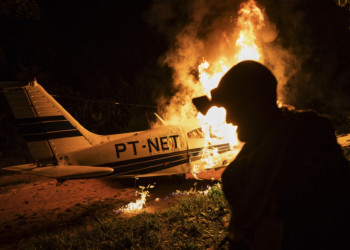Brazil’s foremost criminal group, the PCC, is providing a range of support to illegal gold miners in the Amazon, hindering government efforts to uproot wildcat mining and contributing to further violence against the Indigenous Yanomami community.
Brazil’s Justice and Public Security Minister Flávio Dino announced he was sending 220 extra military police to the Yanomami Indigenous reserve in the northern state of Roraima following violence between illegal gold miners and Yanomami residents that left at least 14 people dead between April 29 and May 6. Those killed include a Yanomami man, killed during an attack on a village by miners on April 29, and four men shot dead at a mining site during a firefight with police on May 1.
While clashes in the Yanomami reserve have been going on for years, this latest surge in violence has erupted as the government of President Luiz Inácio Lula da Silva has driven thousands of miners out of the area.
However, the presence of the First Capital Command (Primeiro Comando da Capital – PCC) is proving to be a complicating factor. One of the four men killed on May 1 was named as Sandro Moraes de Carvalho, alias “Presidente,” allegedly the PCC’s commander in Roraima.
Dino said at a May 18 press conference that the PCC is acting like an “illegal mining union.”
“Why have [operations] in Yanomami territory proceeded without deaths for month, then during the last few weeks, there have been armed clashes? Because elements remaining in the territory are linked to criminal factions,” he said.
SEE ALSO: Brazil Targets Illegal Gold Miners With Force and Legislation
The PCC has provided heavy machinery and weaponry to miners, acted as security at certain sites, and helped to transport extracted gold out of the Amazon, according to an investigation by news magazine Veja, citing public security officials. The PCC also runs prostitution and drug trafficking rings on Yanomami land, the investigation found.
Leaked audio messages attributed to Presidente’s reported replacement in Roraima, identified as alias “Escobar,” have helped to confirm that the PCC has a measure of control over the miners. Prior to his promotion, Escobar reportedly provided security at specific mining camps and could order miners to leave the area.
“They’re coming in heavy … with 200 police. At this exact time, I am removing all the personnel from here,” Escobar can be heard saying in an audio recording taken some time after Presidente’s death, according to Brazilian news platform, UOL, which accessed the recordings. Police sources told UOL that at least 100 miners were known to be linked to the PCC.
The PCC has been present in Roraima since 2013 but began prospecting in the Yanomami territory in 2018, according to Robert Muggah, co-founder of the Igarapé Institute think tank.
“The PCC is a comparatively new and dangerous player in the illegal mining sector,” he told InSight Crime.
InSight Crime Analysis
While thousands of the miners have left the Yanomami Indigenous reservation since Lula took office, the PCC’s influence and support may be encouraging some to hold out and defy security forces.
“Miners attacking Yanomami is nothing new, but miners actively resisting federal forces has been uncommon up until now,” Rodrigo Chagas, a researcher at the Society and Borders Graduate Program and the Brazilian Public Security Forum, told InSight Crime.
Shootouts such as the one that killed the PCC’s Presidente are “not typical” of wildcat miners, he added.
The role of the PCC likely varies across different mining sites. These mining operations are so opaque the PCC can finance mines or buy heavy machinery with drug money without the miners even knowing about these connections, according to Chagas, who added that some PCC members are reportedly taking part in illegal mining directly.
SEE ALSO: Is Brazil’s PCC Trying to Take Over Paraguay’s Marijuana Business?
This increased interconnectivity between drug trafficking and illegal mining has become known as narcogarimpo (a Portuguese portmanteau of narco and garimpo, meaning illegal mining), with the PCC often using the same aircraft to move illegally extracted gold and drugs out of the Amazon.
Even with the Brazilian government increasing its efforts in the territory, Muggah said, “The PCC’s diversification into various aspects of the illegal gold mining industry presents a major challenge to chronically under-resourced police and environmental protection officials operating in the Amazon.”

